Solicita ahora para formar parte de nuestra próxima grupo de Becados en Ciencia científicos comunitarios y líderes comunitarios.
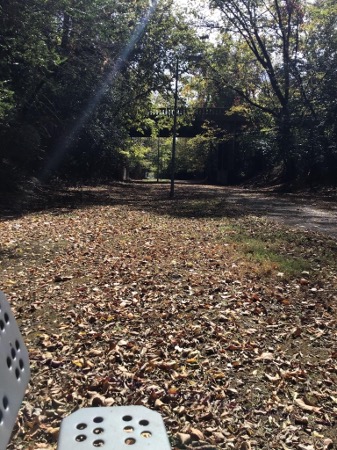
Trail near Enon Ridge and the future site of the Community Land Trust, photo by Wilhelmina Thomas
The historic, resilient, and vibrant Dynamite Hill – Smithfield community faces housing and food insecurity as a result of increasing development and gentrification. A community land trust is planned on 8 land parcels of historical and cultural significance, including regenerative community agriculture, permanently affordable eco-housing, and preservation/interpretation of sacred sites, while accounting for environmental factors such as the potential for storm related flooding. The development of a written document in collaboration with urban planners and environmental engineers will help the Dynamite Hill- Smithfield Community Land Trust (DH-SCLT) non-profit organization communicate their mission with the public, donors, funding agencies, and city officials. This planning phase will result in a blueprint that the DH-SCLT can use to direct efforts towards their vision of serving the present needs of the community while honoring its rich history and stewarding its bright future.
A group of grassroots organizers have been working for the past six years to develop a community land trust in the Birmingham, Alabama community of Smithfield, known by some as Dynamite Hill. This name comes from the community’s tragic history as a target of violent bombings by white supremacists. More than 50 bombings occurred on Dynamite Hill over a 20 year period from 1947-1967. This brutal campaign of terrorism, the years of discrimination and racism that followed, and the freeway that was cut through its center, did not destroy the community. It still exists today, and is working to honor its history while building a sustainable future. The Smithfield of today is 92% black, with 45% of households earning less than $25,000/year, and 63% of children living in poverty. Per the EPA, residents are above the 95th percentile nationally in 9 of 12 Environmental Justice Indexes. As gentrification threatens to displace this vibrant community from the land that they have long fought to call home, the DH-SCLT is working to establish a community land trust right in its heart. Seventy five years later, the first plot of the community land trust was acquired just across the street from the site of the first bombing. The north star for the DH-SCLT is the human right to home, something this community has been fighting for in Smithfield for over 100 years.
DH-SCLT envisions a living relationship with the land that cares for the people who live there now, honors and preserves sacred historical sites and green spaces, and ensures the health of the land for future generations through environmental stewardship. The land trust will include regenerative community agriculture, permanently affordable eco-housing, and interpretive sites which foster a living remembrance of the community’s history. The DH-SCLT plans to acquire 8 plots of land in addition to the one on which they have already established the Sugar Hill Community Farm. The Enon Ridge Pioneers Cemetery is included in this parcel of land, and has more than 130 burials dating back to 1903. The preservation and interpretation of this sacred site is part of the envisioned community land trust.
In collaboration with Thriving Earth Exchange, DH-SCLT will produce a planning document for the development of a community land trust on the available 8 plots of land. This will include a layout of the planned structures and farms, and an assessment of environmental risks and impacts. The planning document will help DH-SCLT communicate their vision to the broader community, city officials, and funding organizations. It will serve as a blueprint while the community takes the next steps toward their vision for the land trust. When it is completed, it will be shared with the community on a new website. By publicly sharing their plan, DH-SCLT hopes to serve as an inspiration for similar land trust projects.
Calendario e hitos
DH-SCLT aims to have this planning phase completed and shared with the public in approximately 12 months
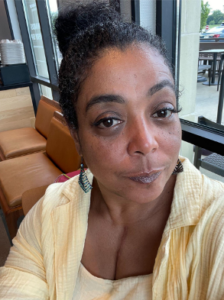
Susan Diane Mitchell – DH-SCLT Cofounder, President, and Executive Director
Susan Diane Mitchell is an Earth protector, healer, artist, community visionary and mother of nine. Born and formed in Washington, DC, she grew up and came of age in Oakland, California, and it was here that she began her journey in ecology, regenerative practices, and nature stewardship. Educated at Spelman College, Jacksonville State University (BA), University of Alabama at Birmingham (MA), and through post graduate studies at California Institute of Integral Studies and National University, her interest in art, consciousness and transformative studies informs her passion for community education, healing and regeneration. Susan has over thirty years of community education experience, and is co-founder , president and executive director of Dynamite Hill-Smithfield Community Land Trust in Birmingham, Alabama.
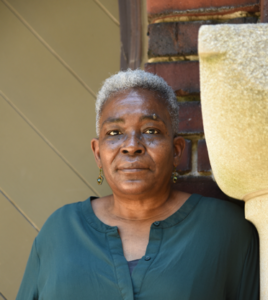
Wilhelmina Thomas – DH-SCLT Director of History and Culture
The Director of History and Culture will focus on preserving the historical and cultural values of the Dynamite Hill-Smithfield Community Land Trust site while implementing community developments which benefit all residents by creating places for people to gather and experience nature.

Matt Dale is a graduating senior attending Birmingham-Southern College. He is majoring in Biology with a distinction in Black Studies. As his passions intersect, Matt will be pursuing a masters in Public Health with a concentration in Health Policy and Organization from the University of Alabama at Birmingham in the fall of 2024. During his time at Birmingham-Southern, Matt has been very involved in his school community as well as the city of Birmingham. He currently serves as the community engagement chair of the Black Student Union, Vice President of his fraternity (Alpha Phi Alpha Fraternity, Inc.), and is a Bonner’s Scholar. This semester, Matt will be serving as Content Strategist for the Dynamite Hill – Smithfield Community Land Trust. He will be developing a plan to build a social presence of the organization, specifically on social media, so that we can continue to move forward with our plans in cohesion with our community. Matt has won numerous awards for his service and dedication to his community including the Rising Leader award, Martin Luther King Jr. Award (2x), and the Diversity, Equity, and Inclusion award. As Matt prepares to graduate, he is pursuing a career in health policy and public service.
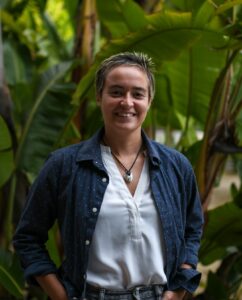
Charlotte Bellerjeau is a PhD student at Scripps Institution of Oceanography, studying the physics of ocean mixing and turbulence near steep undersea topography. She has a BS in Aerospace Engineering from the University of Colorado Boulder, and now uses her engineering background developing a new sensor to make turbulence data more attainable in global observational networks. Charlotte is working to make science and academia more accessible to people from diverse socioeconomic backgrounds by organizing with the UAW branch of academic workers at SIO. She thinks science is done best from a wide range of perspectives and enjoys teaching, mentoring, and community outreach. In her free time, she loves hiking, surfing, and exploring nature.
Urban Planner
Environmental Engineer
Thriving Earth Exchange pide a todos los socios científicos que trabajen con la comunidad para ayudar a definir un proyecto con impacto local concreto al que puedan contribuir como voluntarios y colaboradores pro-bono. Este trabajo también puede posicionar a los científicos y las comunidades para buscar financiación adicional, juntos, para la siguiente fase.
¿Le interesa trabajar como científico voluntario? ¡Inscríbete ya!
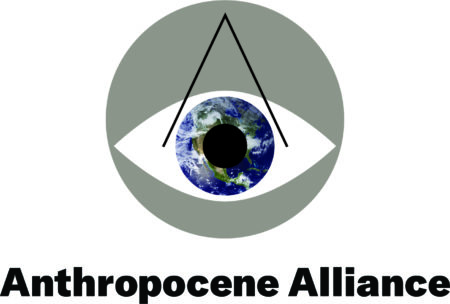

The DH-SCLT relationships with the Anthropocene Alliance (A2) and Community and College Partners (C2P2) are based in mentoring, support, education and networking with other grassroots nonprofits engaged in quality of life and environmental justice service. For the last year, our membership and collaboration with A2 has given us technical guidance, organizational support, and leads to dozens of funding opportunities. More importantly, it has helped us prepare a strong grantee portfolio in order to better market our work to interested funders. In addition, our relationship with C2P2 partners environmental and regenerative earth practice scientists with our work. With this amazing support, we are better prepared to be qualified for funding opportunities, to implement our projects, and to have greater visibility and impact of our work.
(c) 2024 Thriving Earth Exchange